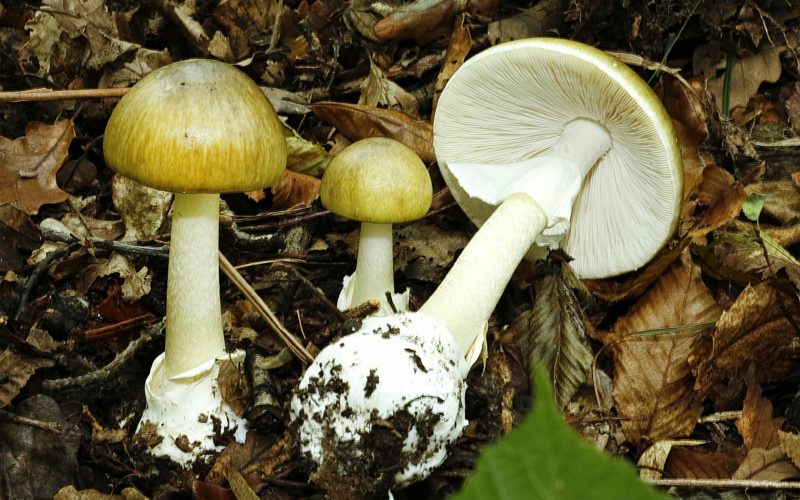Business
Mother, Son Survive Brush With ‘Death Cap’ Mushrooms Thanks to Experimental New Drug

Before I even get to the story, please allow me to tell everybody reading this that if you eat random mushrooms off the ground your liver will eat itself from the inside out over the course of your very painful, very long and drawn-out death. Do not do it, ever. Read many books first and consult trained professionals before ever eating a foraged mushroom.
According to UMass Memorial Medical Center, 27-year-old Kai Chen and his 63-year-old mother Kam Look were poisoned from eating mushrooms, known as “death caps,” which they found growing near their home a few weeks ago in Amherst, Massachusetts.
The two survived, and one of their doctors recently told the Boston Globe it was thanks to the help of Legalon, an experimental drug flown in from Philadelphia made from an extract of the milk thistle plant. Kam did, however, require a liver transplant and the two suffered kidney damage as well.
“The treatment involved getting special permission from the FDA to provide an antidote that’s currently an investigational drug – and then to get that antidote emergently cured from Philadelphia” said Dr. Stephanie Carreiro, from the Division of Toxicology at UMass Memorial Medical Center in a press conference. “We had tried many methods to try to remove the toxin from their bodies. And ultimately, for Kam, it also required liver transplantation.”
Death caps, known amongst nerds as Amanita phalloides, are a mushroom that grow pervasively throughout California and most of the world. According to Mushrooms of the Redwood Coast by Noah Siegel and Christian Schwarz, the mushrooms are all white from top to bottom and commonly grow on wood chips but can be found more or less anywhere in North America. The fatality rate for those who consume death caps varies depending on the source from 25 to 50%.
Death caps and a handful of other particularly prolific and toxic species of mushrooms cause fatalities in people who ingest them every year, largely because the symptoms do not set in immediately after consuming. By the time people seek help, it is often too late and the liver damage has already begun. Kai Chen did, however, tell CBS Boston that they felt something was off pretty quickly.
“This should be a very big cautionary tale,” Kai Chen said in a press conference. “Be careful of what you find out there in the woods, especially mushrooms.”
Levon Durr, owner of a mushroom cultivation business called Fungaia Farms in Eureka, CA, told High Times that death caps have actually just as of this year been recorded in places they have otherwise not yet been found, which could indicate climate change has allowed them to gain more ground, so to speak.
“Amanita phalloides (death cap) has officially been recorded in Humboldt County last year and seems to have been migrating north over the last decade. They have been recorded in the Bay Area for years now and then became more common in Mendocino County and now Humboldt,” Durr said. “The theory is the warming, drying climate has opened up new habitats for them to move north. So, it begs to hypothesize we will, unfortunately, see more poisonings as it expands its habitat into areas where people are less familiar with the death cap.”
Mushroom foraging season is upon us and despite all the most grim warnings I can think of, people will still inevitably go out and mistake one thing for another every year. Mushroom experts have collectively warned the community at large for decades that proper mushroom identification is extremely difficult and requires much more extensive legwork than simple photo comparison. For instance, one of the most commonly hunted psychedelic mushrooms known as “Wavy caps” (Psilocybe cyanescens) have a deadly look-alike called Galerina marginata that oftentimes are virtually impossible to distinguish between without proper training.
“When collecting wild mushrooms for food, one rule supersedes all others. When in doubt, throw it out. If you are not sure that your mushroom is edible, don’t eat it.” – Excerpt from Mushrooms of the Redwood Coast.
Business
New Mexico cannabis operator fined, loses license for alleged BioTrack fraud

New Mexico regulators fined a cannabis operator nearly $300,000 and revoked its license after the company allegedly created fake reports in the state’s traceability software.
The New Mexico Cannabis Control Division (CCD) accused marijuana manufacturer and retailer Golden Roots of 11 violations, according to Albuquerque Business First.
Golden Roots operates the The Cannabis Revolution Dispensary.
The majority of the violations are related to the Albuquerque company’s improper use of BioTrack, which has been New Mexico’s track-and-trace vendor since 2015.
The CCD alleges Golden Roots reported marijuana production only two months after it had received its vertically integrated license, according to Albuquerque Business First.
Because cannabis takes longer than two months to be cultivated, the CCD was suspicious of the report.
After inspecting the company’s premises, the CCD alleged Golden Roots reported cultivation, transportation and sales in BioTrack but wasn’t able to provide officers who inspected the site evidence that the operator was cultivating cannabis.
In April, the CCD revoked Golden Roots’ license and issued a $10,000 fine, according to the news outlet.
The company requested a hearing, which the regulator scheduled for Sept. 1.
At the hearing, the CCD testified that the company’s dried-cannabis weights in BioTrack were suspicious because they didn’t seem to accurately reflect how much weight marijuana loses as it dries.
Company employees also poorly accounted for why they were making adjustments in the system of up to 24 pounds of cannabis, making comments such as “bad” or “mistake” in the software, Albuquerque Business First reported.
Golden Roots was fined $298,972.05 – the amount regulators allege the company made selling products that weren’t properly accounted for in BioTrack.
The CCD has been cracking down on cannabis operators accused of selling products procured from out-of-state or not grown legally:
- Regulators alleged in August that Albuquerque dispensary Sawmill Sweet Leaf sold out-of-state products and didn’t have a license for extraction.
- Paradise Exotics Distro lost its license in July after regulators alleged the company sold products made in California.
Golden Roots was the first alleged rulebreaker in New Mexico to be asked to pay a large fine.
Source: https://mjbizdaily.com/new-mexico-cannabis-operator-fined-loses-license-for-alleged-biotrack-fraud/
Business
Marijuana companies suing US attorney general in federal prohibition challenge

Four marijuana companies, including a multistate operator, have filed a lawsuit against U.S. Attorney General Merrick Garland in which they allege the federal MJ prohibition under the Controlled Substances Act is no longer constitutional.
According to the complaint, filed Thursday in U.S. District Court in Massachusetts, retailer Canna Provisions, Treevit delivery service CEO Gyasi Sellers, cultivator Wiseacre Farm and MSO Verano Holdings Corp. are all harmed by “the federal government’s unconstitutional ban on cultivating, manufacturing, distributing, or possessing intrastate marijuana.”
Verano is headquartered in Chicago but has operations in Massachusetts; the other three operators are based in Massachusetts.
The lawsuit seeks a ruling that the “Controlled Substances Act is unconstitutional as applied to the intrastate cultivation, manufacture, possession, and distribution of marijuana pursuant to state law.”
The companies want the case to go before the U.S. Supreme Court.
They hired prominent law firm Boies Schiller Flexner to represent them.
The New York-based firm’s principal is David Boies, whose former clients include Microsoft, former presidential candidate Al Gore and Elizabeth Holmes’ disgraced startup Theranos.
Similar challenges to the federal Controlled Substances Act (CSA) have failed.
One such challenge led to a landmark Supreme Court decision in 2005.
In Gonzalez vs. Raich, the highest court in the United States ruled in a 6-3 decision that the commerce clause of the U.S. Constitution gave Congress the power to outlaw marijuana federally, even though state laws allow the cultivation and sale of cannabis.
In the 18 years since that ruling, 23 states and the District of Columbia have legalized adult-use marijuana and the federal government has allowed a multibillion-dollar cannabis industry to thrive.
Since both Congress and the U.S. Department of Justice, currently headed by Garland, have declined to intervene in state-licensed marijuana markets, the key facts that led to the Supreme Court’s 2005 ruling “no longer apply,” Boies said in a statement Thursday.
“The Supreme Court has since made clear that the federal government lacks the authority to regulate purely intrastate commerce,” Boies said.
“Moreover, the facts on which those precedents are based are no longer true.”
Verano President Darren Weiss said in a statement the company is “prepared to bring this case all the way to the Supreme Court in order to align federal law with how Congress has acted for years.”
While the Biden administration’s push to reschedule marijuana would help solve marijuana operators’ federal tax woes, neither rescheduling nor modest Congressional reforms such as the SAFER Banking Act “solve the fundamental issue,” Weiss added.
“The application of the CSA to lawful state-run cannabis business is an unconstitutional overreach on state sovereignty that has led to decades of harm, failed businesses, lost jobs, and unsafe working conditions.”
Business
Alabama to make another attempt Dec. 1 to award medical cannabis licenses

Alabama regulators are targeting Dec. 1 to award the first batch of medical cannabis business licenses after the agency’s first two attempts were scrapped because of scoring errors and litigation.
The first licenses will be awarded to individual cultivators, delivery providers, processors, dispensaries and state testing labs, according to the Alabama Medical Cannabis Commission (AMCC).
Then, on Dec. 12, the AMCC will award licenses for vertically integrated operations, a designation set primarily for multistate operators.
Licenses are expected to be handed out 28 days after they have been awarded, so MMJ production could begin in early January, according to the Alabama Daily News.
That means MMJ products could be available for patients around early March, an AMCC spokesperson told the media outlet.
Regulators initially awarded 21 business licenses in June, only to void them after applicants alleged inconsistencies with how the applications were scored.
Then, in August, the state awarded 24 different licenses – 19 went to June recipients – only to reverse themselves again and scratch those licenses after spurned applicants filed lawsuits.
A state judge dismissed a lawsuit filed by Chicago-based MSO Verano Holdings Corp., but another lawsuit is pending.
Source: https://mjbizdaily.com/alabama-plans-to-award-medical-cannabis-licenses-dec-1/
-

 Business2 years ago
Business2 years agoPot Odor Does Not Justify Probable Cause for Vehicle Searches, Minnesota Court Affirms
-

 Business2 years ago
Business2 years agoNew Mexico cannabis operator fined, loses license for alleged BioTrack fraud
-

 Business2 years ago
Business2 years agoAlabama to make another attempt Dec. 1 to award medical cannabis licenses
-

 Business2 years ago
Business2 years agoWashington State Pays Out $9.4 Million in Refunds Relating to Drug Convictions
-

 Business2 years ago
Business2 years agoMarijuana companies suing US attorney general in federal prohibition challenge
-

 Business2 years ago
Business2 years agoLegal Marijuana Handed A Nothing Burger From NY State
-

 Business2 years ago
Business2 years agoCan Cannabis Help Seasonal Depression
-

 Blogs2 years ago
Blogs2 years agoCannabis Art Is Flourishing On Etsy













